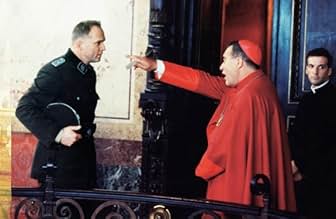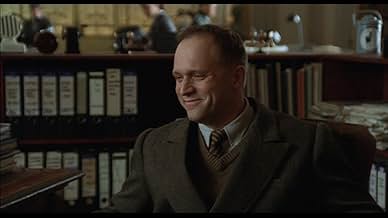SS-Offizier Kurt Gerstein will Papst Pius XII. darüber informieren, dass Juden in Vernichtungslager gebracht werden. Der junge Jesuitenpriester Riccardo Fontana hilft ihm bei der schwierigen... Alles lesenSS-Offizier Kurt Gerstein will Papst Pius XII. darüber informieren, dass Juden in Vernichtungslager gebracht werden. Der junge Jesuitenpriester Riccardo Fontana hilft ihm bei der schwierigen Mission, die Welt zu informieren.SS-Offizier Kurt Gerstein will Papst Pius XII. darüber informieren, dass Juden in Vernichtungslager gebracht werden. Der junge Jesuitenpriester Riccardo Fontana hilft ihm bei der schwierigen Mission, die Welt zu informieren.
- Regie
- Drehbuch
- Hauptbesetzung
- Auszeichnungen
- 4 Gewinne & 9 Nominierungen insgesamt
Empfohlene Bewertungen
The pic is correctly based on historic deeds and famous personages as Pio XII and Nazi chiefs who don't appear in the film but they're continuously named as Goering , Goebbles , Himmler , Eichmann ,thus as notorious events as Stalingrado (1943) where Nazis have the first important defeat and the bombing strikes over the Germany cities (Berlin , Dresde) . The movie is based on a play by German playwright Rolf Hochhuth which started a lot of heated discussions and arguments after its first release in 1963. The film blends drama , tension , historical events and in spite of the runtime is two hours and some isn't boring , nor dreary but happens enough interesting deeds . The Vatican did not give a permission to shoot the film in their buildings. After searching a scenery of adequate size for the scenes taking place in the Vatican, Costa-Gavras finally chose Europe's largest building, the House of the People in Bucharest . Some of the outdoor scenes were shot in Mogosoaia Palace, some fourteen kilometers northwest of Bucharest. The movie attained quite polemic but there's an accusation to Catholic Church for passivity on the crimes and mass slaughter . I really think that didn't have but lack of forecast . The motion picture was well directed by Constantine Costa Gravas who at all his films always gets controversy and dispute . Rating : Above average . Well worth seeing .
Another perfect performance is given by the priest who tries to help the German officer. Mathieu Kassovitz (who also played the male leading role in 'Le Fabuleux destin d'Amélie Poulain')is very convincing in his role.
I think this movie is highly underrated. Costa-Gavras has made an important movie with 'Amen.' which looks at the holocaust-tragedy from another point of view which is seldom showed. The movie gives a true although unbelievable answer at one of the most important questions concerning the holocaust: didn't anyone saw this coming? Couldn't anyone prevent this from happening?
If you really want to know the answers to this questions, you certainly have to watch 'Amen.'. This movie should at least have an 8 and I'll give you two reasons why: one because the story is unique and magnificently told; and two because the two leading actors are giving the performance of a lifetime. Highly recommendable!
9/10
"Amen" begins with the Nazi euthanasia program aimed at murdering retarded and mentally ill Germans. A campaign, spearheaded by both Protestant and Catholic clerics and their flocks, forced the regime to end the killings. Some have argued that this sole widespread public rejection of Nazi homicidal machinations might well have been repeated if Germans were alerted - internally or through specific denunciations by the pope and foreign leaders - of the fate of deported Jews and those rounded up in conquered territories. "Amen's" Kurt Gerstein and his priest friend both believe that would have happened.
That argument is at best questionable and, more likely, reflects the human need for the wish to spawn the thought. Whether one accepts the Goldenhagen thesis of mass complicity by Germans in the Holocaust, the fact remains that when the slaughter began Germany was at war and, as a character in "Amen" notes, defending the Reich and winning the war, to say nothing of staying clear of what would be seen as treasonous ideas, was the only realistic option.
Kurt Gerstein is a mystery. As Hannah Arendt wrote of Eichmann as an example of evil's often banal incarnation, historian Saul Friedlander described Gerstein years ago in terms of the ambiguity of good. Gerstein sincerely and at risk to his life tried to warn the Vatican of the Nazi death camps. But he also worked efficiently to make those camps operationally efficient. "Amen's" Gerstein is tortured but also highly compartmentalized. He gives quick and accurate advice to improve destruction of the "units," as the Jews were referred to, and then tries to prevent use of the Zyklon B gas he helped develop with almost unbelievable declarations that shipments are defective and must be buried.
This film owes its origin not so much to Friedlander's compelling account but to Rolf Hochhuth's controversial (still so after many years) "The Deputy," presented as a play to the outrage of many. Hochhuth portrayed Pope Pius XII as insensitive and unwilling to use his moral authority to challenge an extermination program he knew to be in progress.
In the film Gerstein is aided by a young Jesuit priest whose remarkable moral and physical courage was demonstrated by a few, or perhaps too few, clerics who knew what was happening. The pope is shown as a remote, unemotional figure. The now standard explanations for the Vatican's unwillingness to take on the Nazis are included in catalogue format. Allied unwillingness to bomb the death camps or take in refugee Jews are recited almost for the record. Complex questions still debated are reduced to the equivalent of sound bites. They need no repeating here.
Hochhuth's thesis which outraged many decades ago and which still brings angry denunciations has been partially rehabilitated by scholarly works such as John Cornwell's provocatively titled study, "Hitler's Pope," an exaggeration which belies the serious research and analysis within the book's covers.
Cornwell's pope is personally unpleasant, haughtily autocratic, rabidly fearful of Communism, at least mildly anti-Semitic and certainly emotionally and politically pro-German if not pro-Hitler (he wasn't that). The Pope Pius of "Amen" lacks the depth a more accurate and compelling portrayal would have provided.
The strongest moments in the film are those briefly showing the efficiency of the death camps focusing less on the victims, most of whom aren't shown, but rather on the chillingly competent technicians and logisticians without whose efforts millions could not have been murdered.
Director Costa-Gravas deserves much credit for bringing a difficult to tell complex story to the screen. Ultimately, however, we know less about Kurt Gerstein than we need to and the Vatican, from pope to bureaucrat, is too colorless. Was Gerstein a victim or a collaborator with a schizophrenic sense of morality? Even scholar Friedlander couldn't answer that question. Did the Vicar of Christ shame his church's vision of Jesus by putting political expediency ahead of moral imperative? That is a very alive issue today but "Amen" gives us a largely one-dimensional Supreme Pontiff.
The cast is unknown to American viewers but all act with varying but generally strong ability. Gerstein and the Jesuit priest are especially well portrayed as men of deep conviction.
7/10
The murder of his niece and the Jews appalls his Christian conscience. His wincing reaction whilst looking through the gas chamber spy-hole is well-acted. He alerts the Swedes and the Catholic Church, hoping that international pressure will awaken the German conscience. Catholic opposition has stopped the euthanasia programme and this can be mobilised to help the Jews.
In reality, Gerstein's options are limited. His own church leaders react mutely to his news of mass-murder. They caution restraint. Nazi indoctrination is trying to turn everyone into a rabid anti-Semite - as shown comically with Gerstein's youngest son giving annoying Hitler salutes. Most Protestants agree to join the new Nazi-sponsored 'Reich Church', happily reconciling faith with Nazism. Similarly, the 1933 Concordat with Hitler gave the Catholic Church a precarious protection as long as it stayed out of politics.
Carpet-bombing of German cities is killing women, children and babies. German forces are engaged in a titanic struggle against the 'forces of international Jewry ' - Russian Communism and American Capitalism. Facing this kind of mind-set and mass paranoia, the Jews needed a miracle. Saving mentally-handicapped members of German families is one thing. Saving a long-despised race thought to be the root cause of every world problem is very much another.
Gerstein's attempts to alert the Vatican are channelled through an invented character, a young Catholic priest who symbolises the conscience of thousands of individual Catholics who risked their lives to help Jews. He eventually sacrifices himself at Auschwitz, a Christ-like figure who 'redeems' his religion in the face of a terrible evil.
The controversial Pope Pius XII is portrayed in a curiously anodyne way - to the distaste of those who regard him as a Nazi sympathiser. The Vatican's fear of Communism, its efforts to hide Italian Jews and its self-preservation instinct in facing the Nazis are all clearly demonstrated. As is the help it gave to individual SS men on the run after the war. One is left to make up one's own mind about the Pope.
In truth, neither the Church nor the SS were monolithic organisations. Both were composed of individuals, good and bad. One reason for death factories was to save SS men from the horrors of mass-shootings. They offered a 'sanitised' method of killing, just as the 1933 Concordat offered a sanitised way for Nazism and Catholicism to relate to each other. Problems arose for individuals who had to make moral choices in carrying out these policies.
The controversial Roman lunch scene depicts the American ambassador discussing the fate of the Jews with Vatican big-wigs. Against a wonderful panoramic backdrop of the eternal city, they enjoy an excellent sea food meal. The American points out that finding an alternative home for millions of Jews would cause great problems. Nazi retaliation would only make things worse, counters a Vatican big-wig. A far cry from the cattle trucks rolling to and fro, emptying Europe of its Jews. This is a 'cheap shot' - decision-makers usually enjoy better material conditions than the rest of us. One can imagine Churchill discussing sensitive topics in a cold-blooded way over many a fine meal. It makes for good cinema, though!
This is an excellent film which covers a vast topic in 2 hours. It does not make judgements about Gerstein or the Christian churches. The Gerstein character is a complex one as is the Christian response to the Holocaust. It shows how difficult it is to 'buck the system' during wartime. Gerstein arrives at Auschwitz with the comforting knowledge that the allies 'never bomb the camps' - they know they are full of 'POW's'. Would prolonged bombing of the railways to the death camps have made a difference? Many Jews believe that this could and should have happened.
Should the allies have re-directed their military efforts to save Jews rather than merely fight the Nazis? Unfortunately, the 1930's and World War 2 had de-sensitised people to civilian suffering - newsreels from China, Abyssinia, Guernica; the Nazi bombing of Warsaw, Rotterdam, London, Coventry, the V1 and V2 attacks of 1944. World War I blurred the line between soldiers and civilians. World War 2 completely obliterated this distinction - on both sides of the conflict. Axis forces brought death to millions of Chinese and Russian civilians. The Allied bombing of Germany, Japan and northern France all produced heavy civilian casualties. Is there an essential difference between mass-bombing and the Holocaust?
European anti-Semitism aided the Holocaust. The miracle is that so many individual Gentiles did so much to aid Jews. Nazism put new ideas about human rights to the test. Governments and organisations may have been found wanting especially Vichy France. Individuals - including many brave Germans responded magnificently. This is the 'positive' side of the Holocaust which we should remember and treasure. Gerstein did his best to sabotage and stop the killing machine he became part of. The film allows us to make up our own minds about whether he and the Catholic Church did enough.
Wusstest du schon
- WissenswertesStefan Lux was a Jewish Czech journalist, who committed suicide in the general assembly room of the League of Nations during its session on July 3, 1936, to alert the world on the perils of German anti-Semitism. After shouting "C'est le dernier coup" ("This is the final blow") he shot himself with a revolver.
- PatzerIn one of the scenes they say that the Treblinka camp is out of gas, referring to Zyklon B. Treblinka didn't use Zyklon B, instead they used carbon monoxide.
- Zitate
[first lines]
Stephan Lux: [interrupting a session of the Assembly of the League of Nations, Geneve, 1936] My name is Stephan Lux. I am Jewish. The Jews are being persecuted in Germany and the world doesn't care.
[He draws a pistol]
Stephan Lux: I see no other way to reach people's hearts.
[He shoots himself]
- VerbindungenReferenced in Kaamelott: Amen (2005)
- SoundtracksThe Train I /II
Composed and arranged by Armand Amar
Orchestra:
Jean-Philippe Audin, Elsa Benabdallah, Igor Boranian, Fabien Boudot, Florent Bremond, Karen Brunon, Nathalie Carlucci, Hervé Cavellier, Emmanuel Gaugué, Thierry Köhl, Julien Leenhardt, Bobin Minalli Bella, Marthe Moinet, Yves Monciero, Philippe Morel, Amèlie Paradis, Emmanuel Raynaud, Alexandre Sauvaire
(P) & © 2002 Long Distance/France
Top-Auswahl
- How long is Amen.?Powered by Alexa
Details
- Erscheinungsdatum
- Herkunftsländer
- Offizielle Standorte
- Sprachen
- Auch bekannt als
- Amen.
- Drehorte
- Produktionsfirmen
- Weitere beteiligte Unternehmen bei IMDbPro anzeigen
Box Office
- Budget
- 103.000.000 FRF (geschätzt)
- Bruttoertrag in den USA und Kanada
- 274.299 $
- Eröffnungswochenende in den USA und in Kanada
- 16.284 $
- 26. Jan. 2003
- Weltweiter Bruttoertrag
- 8.419.052 $
- Laufzeit
- 2 Std. 12 Min.(132 min)
- Farbe
- Sound-Mix
- Seitenverhältnis
- 1.85 : 1

































